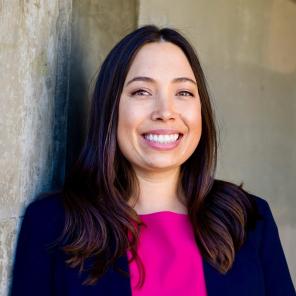
Jean Marie Star, DDS, MPH, is an Assistant Professor in the Department of Orofacial Sciences. She holds a DDS degree from UCSF School of Dentistry, where she completed her pediatric dentistry specialty training. Dr. Star also earned an MPH from the Harvard T.H. Chan School of Public Health, focusing on social determinants of health. As a board-certified pediatric dentist and clinician-scientist, her research centers on the intersection of pediatric dentistry and public health. She is dedicated to improving access to dental care and enhancing safety for children and adolescents in dental settings, this is also a focus of her research. Dr. Star's work has published on adverse events in pediatric dentistry, the minority dental workforce in the United States, and novel interventions to improve dental care for vulnerable populations such as those from rural communities and those with special healthcare needs. She is dedicated to the study and advancement of equitable oral health outcomes for all children.
Please briefly describe your background and research interests.
I have received training in both public health and pediatric dentistry. Over the years, my research endeavors have predominantly revolved around the fields of health services, patient safety, and the healthcare needs of individuals with special healthcare requirements.
How did you first learn about the AADOCR Mind the Future Program, and what motivated you to apply?
My introduction to the AADOCR Mind the Future Program came through a colleague at the University of California, San Francisco. This knowledgeable colleague, who was aware of the program, encouraged and motivated me to submit my application, piquing my interest in the opportunities it presented.
What has been the most valuable benefit of AADOCR membership to you?
One of the most valuable benefits I've derived from my AADOCR membership is the chance to interact with fellow junior faculty members. This networking opportunity has allowed me to build a robust support system by connecting with peers and mentors. Moreover, being a part of AADOCR has exposed me to a wide array of research projects and endeavors from various institutions, enriching my understanding of the dental and oral health research landscape.
Are you going to next year’s IADR/AADOCR General Session in New Orleans? If so, which parts are you most looking forward to?
I am indeed planning to attend next year's IADR/AADOCR General Session in New Orleans. Among the many exciting aspects of the event, I am particularly looking forward to seeing the diverse range of posters from different institutions, which will provide valuable insights into the latest research developments. Additionally, meeting scientists who share my areas of study holds the potential for fostering collaborations and knowledge exchange. Furthermore, the event will offer a fantastic opportunity to broaden my awareness of the various types of research studies underway at different institutions.
What is the best way for other members to become more involved in AADOCR and get the most out of the membership?
To maximize their engagement with AADOCR and reap the most benefits from their membership, I recommend that other members consider reaching out to active faculty members within their institutions who are also involved with AADOCR. These interactions can provide valuable guidance on how to become more actively engaged. Additionally, attending AADOCR meetings and events is an excellent way to stay connected, informed, and to actively participate in the organization's activities, ultimately enhancing the overall membership experience.




